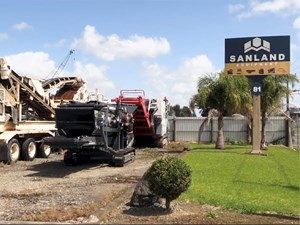Cover story: Steve Camden
Deals on Wheels visited contractor Steve Camden to find out what keeps the wheels of his business turning in Central Hawke’s Bay
There’s plenty of work to keep Steve busy in the rural region where he lives with his family on a lifestyle block. Could it be that city folk are finding their way to the quieter regions to lower their mortgages, get a foothold on the property ladder, or find an alternative to living in the big smoke? Whatever the reason, much of his work is related to the building industry, so that’s a good thing.
Steve named his business Digerz because that’s what he mainly does, although, when he started out contracting 16 years ago, he ran his own fencing business. After selling that, he went out and bought a three-tonne Takeuchi excavator.
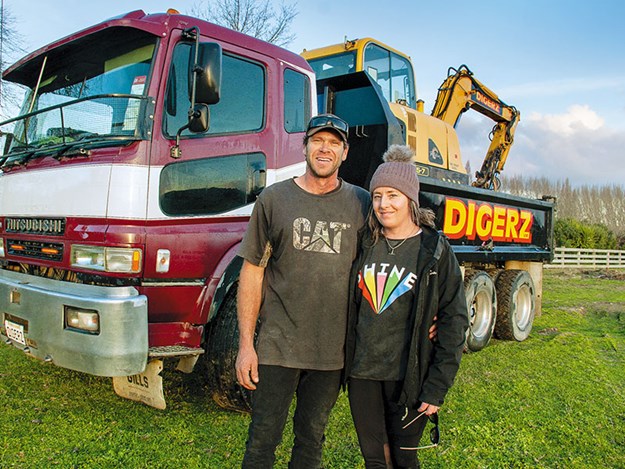 |
|
Steve and his partner Casey Lancaster enjoy living on their four-acre lifestyle block
|
"I told the guy to just put it on the truck, and I’ll deal with it when I get home. I started from there; I had no real experience before this. The Takeuchi was quite old; I ended up fixing it, and then I bought something a bit newer—a second-hand Kubota and ran that for 6000 hours before I bought a brand-new Airman excavator."
When the recession hit in 2008, Steve went to work for a franchisee for Totalspan steel buildings for five years doing site preparation. More work for a local contractor followed before he decided it was time to focus on his excavation work again.
Steve’s latest excavator is a 1.7 Yanmar. He also has a six-tonne Hyundai, but it’s the Yanmar he uses for all the smaller jobs. An older model that he used previously made him stick with the same brand.
"It’s well-built, smooth to operate, and has had minimal breakdowns; it’s very reliable. I’ve had this one for three years, and it has done 3000 hours, and I’ve only had to replace one hose in that time. Because I nurse it along carefully, I’m still on my original tracks. Many people say you get 1000 hours out of a set of tracks; I am at 3000 hours and still on the originals."
Steve tells how he lost a wheeled excavator in the Tuki Tuki River a few years ago.
"I was carting shingle out of the river; I used to leave it down there, and we had one of those 20-year floods overnight. It began raining about 9pm and didn’t stop. I drove over the bridge in the morning, and the water was bank to bank, and I sort of knew where my digger was. It was destroyed. That slowed me down a bit. I’d just bought a brand-new truck, and suddenly, I didn’t have anything to load it with. I had to buy another machine.
Covered for all jobs
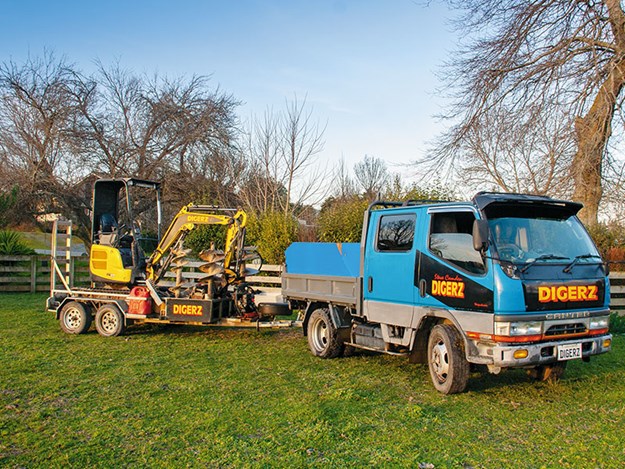 |
|
The Mitsubishi Canter with a purpose-built trailer is a versatile unit
|
Over the years, different trucks have been a part of Steve’s fleet, too, but he’s most pleased with his recent one—a 2002 430hp Mitsubishi Shogun. He took the bin from a previous truck and added it to make it a tipper. It also carries his Hyundai excavator, with ramps for loading and unloading.
Steve also has a three-tonne Mitsubishi Canter, which carries two metres of metal compared to 11 tonnes on the big truck. He uses the Mitsubishi Canter to tow 1.7 Yanmar on-board the trailer.
Talking about trailers, Steve also owns a custom-built Trailux from the Trailer Centre in Upper Hutt that he and owner Karl Robinson designed together.
"We spent time measuring where the implements would fit, and in the end, we made it all work. It carries my drills, has a stand for my powerhead and compacter, and holds the buckets all in place. It’s a good set-up."
Besides this, he says it’s easy to see if something is missing.
"You know you haven’t left it on the job, and that can happen quite easily, especially with your rake. All that sort of stuff takes years to work out to ensure you don’t lose gear or leave it behind. I cart all my gear on that trailer, so I have everything I need and more when I turn up to the job. Sometimes, you get there to do trenching, and clients see your drills and ask for holes to be drilled or some other work. Often, they don’t know they want a particular job done until they see what tools I’ve got. It means I’m covered for any job."
Building sites
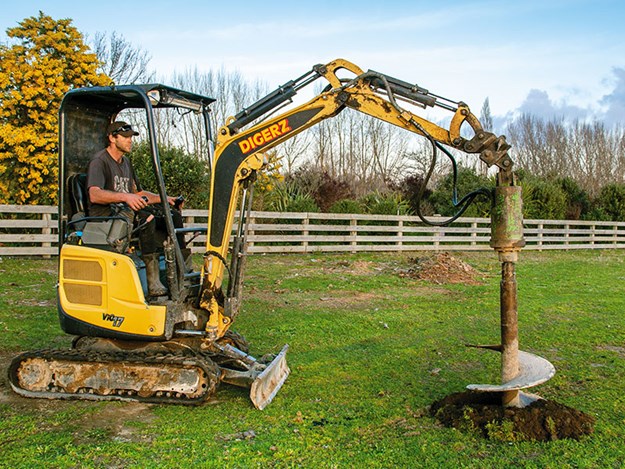 |
|
The 1.7 Yanmar is Steve’s favourite excavator
|
Much of Steve’s work revolves around preparation work on building sites in his local area around Waipukurau and Waipawa. Rural work, such as drilling foundation holes for pole sheds, house piles, fences, and retaining walls further afield takes him out into the wider rural area.
Steve has built a network of contacts he regularly works with, including plumbers, builders, and building companies doing site preparation, footings and concrete preparation, house sites, and driveways.
"I’ve also started to do concrete cutting (slabs and house floors) lately as well. As demand increased, I bought a new concrete cutter and set up a trailer with my tools. I work for a handful of building contractors to do their floors."
Next on Steve’s list to buy is a chain trencher so he can do trenching for power cables.
"It will make the task more efficient. Some power trenches need to be 300mm wide to put the mag slab in and an excavator is the only way at times. You dig a 600x300mm wide trench with the digger to put the mag slab in, or you can do a smaller trench 150 wide with a trenching machine.
'"I like the small machinery. There’s an art to driving the small machines; you get in some tight, tricky situation at times. When you get into brand-new houses, you need to concentrate; you don’t want to go bumping things around. That’s where your skills come in."
Mechanically minded
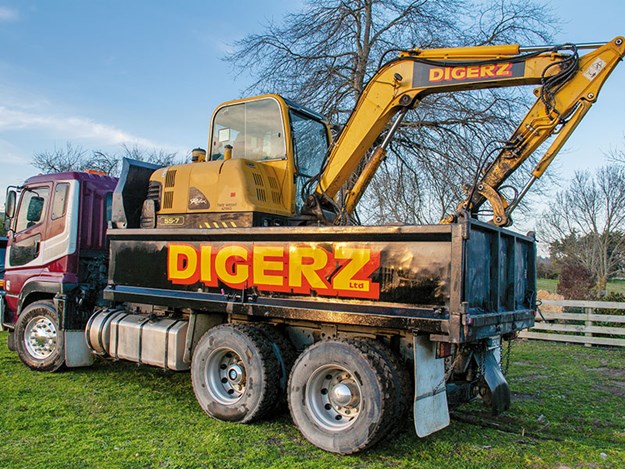 |
|
Steve swapped a steel bin from another truck to make a robust tipper
|
Steve says he’s learned to do all his repairs and servicing by "just giving stuff a go."
When starting out, it was a case of having to because of the cost of taking it to be repaired.
"I’ve learned these skills over the years. I have a good workshop at home, so especially on a rainy day, I’ll do repairs and maintenance. Most might just take the day off, but I usually spend it changing the oil on the digger or carrying out other repairs such as welding and bucket repairs. I’ll often have to check my truck, so I am ready to go for the next job. You don’t want breakdowns when you are busy."
Keep up to date in the industry by signing up to Deals on Wheels' free newsletter or liking us on Facebook.




.jpg)


.jpg)



.jpg)
.jpg)
.jpg)
.jpg)

